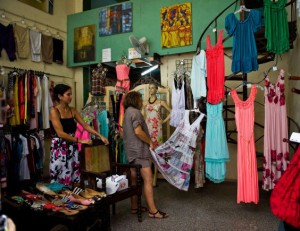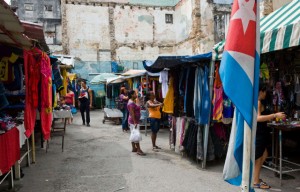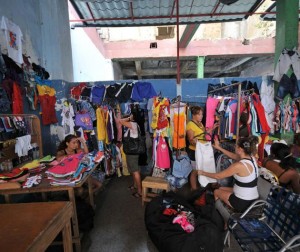
HAVANA, Cuba , October, www.cubanet.org – Of the 436,342 Cubans reported, as of the end of June, to have licenses to practice in the private sector (with the greatest presence in Havana, Matanzas Villa Clara, Camaguey, Holguin and Santiago de Cuba), the number of contract workers accounts for18%. This is evidence that in the past two years small private businesses have been the main source of employment for men and women, mostly young, at a time when the State sector reported excess payrolls, with a million workers who will have to be dismissed.
Among that 18% of contract workers, are those who work as clerks in the thousands of stores that sell imported clothes — a very great number — after those working in small restaurants, pizzerias and cafes, and drivers of cars and trucks rented for the transport of passengers and goods.
For residents of the major cities of Cuba has become normal to see in the doorways of many houses and premises areas adapted for the sale of factory-made clothing brought from abroad, which is very popular with the public, given that the clothes are more attractive than those found in the State’s Foreign Exchange Recovery Shops (TRD) — which is the formal name for hard currency stories.
The owners of these establishments, who are licensed as seamstresses or tailors, have paid their taxes monthly and submitted the affidavits of their sales, in which they state the number of employees hired.
 In general, business was good, until Marino Murillo Jorge, vice president of the Council of Ministers, at meetings of the National Assembly of People’s Power held on July 6 and 7, expressed alarm that the private sector, according to his remarks, “Is demonstrating indiscipline, among many of them, as is the case for those who have a license for one activity and undertake another.” He gave the example of dressmakers and tailors, who are involved in selling imported clothes. He said that this can not continue, “It will have to be rectified with a new legal standard that fixes the scope of each activity.”
In general, business was good, until Marino Murillo Jorge, vice president of the Council of Ministers, at meetings of the National Assembly of People’s Power held on July 6 and 7, expressed alarm that the private sector, according to his remarks, “Is demonstrating indiscipline, among many of them, as is the case for those who have a license for one activity and undertake another.” He gave the example of dressmakers and tailors, who are involved in selling imported clothes. He said that this can not continue, “It will have to be rectified with a new legal standard that fixes the scope of each activity.”
On the first of September, without waiting for tResolution 42 to go into effect, the Administrative Councils of the provinces of Pinar del Río, Sancti Spiritus and Cienfuegos banned the sale of imported clothing in all their municipalities.
And most recently, on the 26th of the same month, in a special edition, No. 27, of the Official Gazette of the Republic of Cuba published Resolution No. 353/2013 from the Ministry of Finance and Prices, referring to the rules for the taxation of persons engaged in private activity and monthly minimum tax account payments. Resolution No. 42/2013 from the Ministry of Labour and Social Security (MTSS) was also published, setting out the rules for the authorizations of private businesses.
 The MTSS Resolution clears up any doubts about activities that have been engaged in for a long time but that, according to Murilla, were never authorized by the license. It clarifies that the owners of seamstress and tailor licenses may engage in, “Making, fixing, and transforming clothes, performing simple and complex tailoring and sewing to measure, and this does not include trading in industrially manufactured or imported clothing.”
The MTSS Resolution clears up any doubts about activities that have been engaged in for a long time but that, according to Murilla, were never authorized by the license. It clarifies that the owners of seamstress and tailor licenses may engage in, “Making, fixing, and transforming clothes, performing simple and complex tailoring and sewing to measure, and this does not include trading in industrially manufactured or imported clothing.”
But this issue, as it is raised, causes a huge problem: Of those who have a license to engage in private activity in Cuba, 68% had no State employment, and 32% were retired State workers, which makes clear the negative effect the prohibition of sale of imported clothing will have.
Starting this month, thousands of people will join the ranks of the unemployed and their families will be plunged into poverty.
All indications are that the enforcement of the above Resolution is the result of pressure exerted by the colonels and generals who control retail trade in dollars. Looking at the balance of sales for the first semester set off alarms about the low “recovery of dollars” in the State stores. The precipitous drop in sales in the majority of TRDs is attributed to small private businesses engaged in selling imported clothes, which had won — fair and square — more than 85% of the clientele.
Osmar Laffita Rojas, ramsetgandhi@yahoo.com
From Cubanet, 11 October 2013
